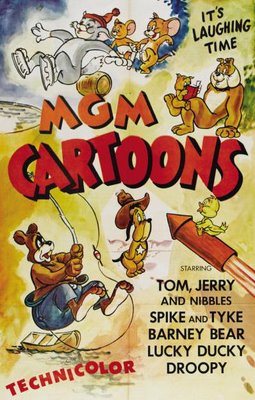
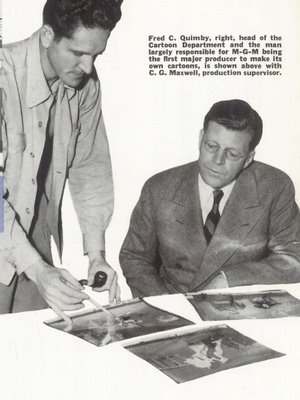
Where Were Those MGM Cartoons When I Needed Them? --- Part One
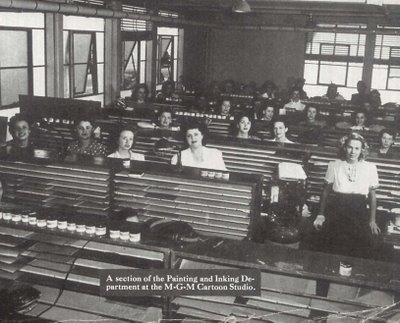
I was always a cartoon Main Titles junkie. Logos and credits were more fulfilling than the short itself in many cases. Programs that excised openers and went straight to the body of the film were hobbled from a start. Walter Lantz introduced his Woody Woodpecker subjects, then went direct to a stark title card, omitting the credits. It wasn’t until these packages showed up in syndication around 1977 that I first saw a Universal logo on a Walter Lantz cartoon. Disney was as bad for depriving us of titles. The only time I saw Mickey, Donald, or Silly Symphonies on television was when a Mouseketeers introduced that afternoon’s cartoon, none of which bore titles. Disney used shorts on the Sunday night NBC show as well, but often as not fading up to the story from Walt's intro. Again, no credits. It was through collecting 16mm that I was able to see RKO logos and United Artists legends on the main card of a Disney subject. Frustration of going without credits was bad enough, but what about cartoons that never showed up at all? For all I knew, Columbia never had its name on an animated product prior to Mister Magoo, and MGM’s only contribution was Tom and Jerry. I saw my first Metro Captain and The Kids as an extra with A Day At The Races on DVD. I understand there were only fifteen of these, most in black-and-white. They never turned up on North Carolina television to my recollection. All we had by way of vintage cartoons were Popeye and Warner Bros. Was it like this elsewhere, or was my state peculiarly deprived? Metro shorts are a curiosity. They made hundreds of animated shorts. There’s not much information about the broadcast histories of those packages between the fifties and seventies, but apparently they were available from September 1960 onward …
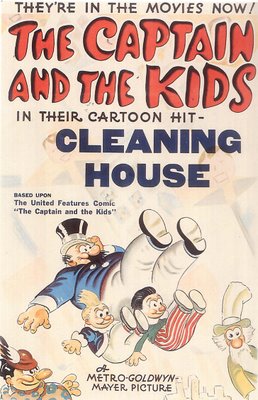
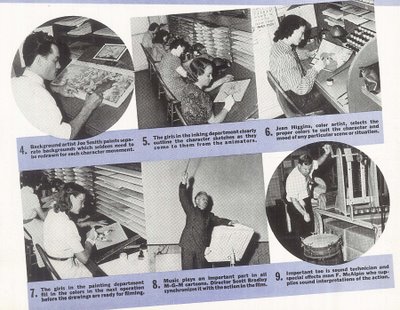
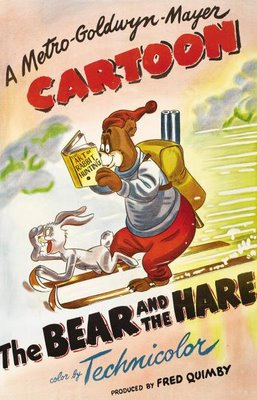
MGM cartoons were supposedly the last of the major studios’ pre-1948 animated films released to television. The deal was struck with United Artists TV Distribution, but did not include the ongoing Tom and Jerry series, which remained a popular theatrical mainstay well into the sixties. From 1960, the Metros were leased to local stations as kiddie programming, filling time between live host segments. Barney Bear was an umbrella title for some of after-school shows, as the package contained the first fifteen entries from that series, as well as thirteen MGM Bosko shorts, fifteen Captain and The Kids, and numerous Happy Harmonies produced by Hugh Harman and Rudolpf Ising. There were 135 cartoons in the group, and 120 were in color. By the time they became available, United Artists already had much larger packages of Popeye and Warner Bros. shorts in play across the country. The MGM subjects were in direct competition with name-brand animated products that had a four-year head start in clearing virtually every syndicated market. How could Barney Bear compete with Bugs Bunny? It must have been hard selling cartoons with no recognizable characters. UA salesmen in the field would find it far easier to move a Popeye group over these Metros. I assume MGM cartoons wound up with stations outbid by broadcast rivals that grabbed off Bugs and Daffy first, but question arises as to what sort of terms UA exacted for the Metros. My guess would be high --- their lease with MGM was probably no bargain. Is this why so few saw these cartoons growing up? I’ve spent a last few days asking among friends around the country, and none of them recall seeing a Happy Harmonies on television (especially prior to the late seventies).
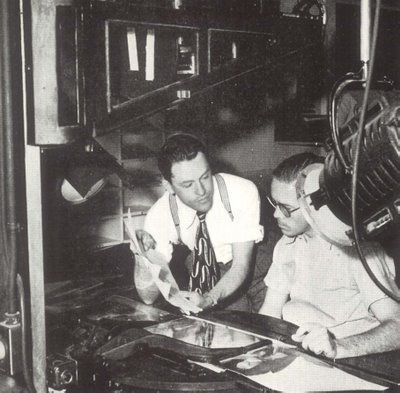
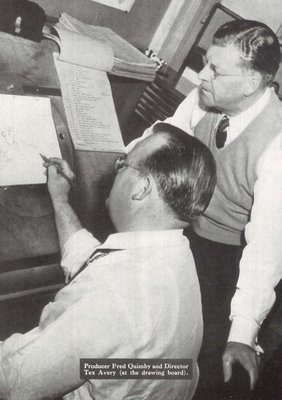
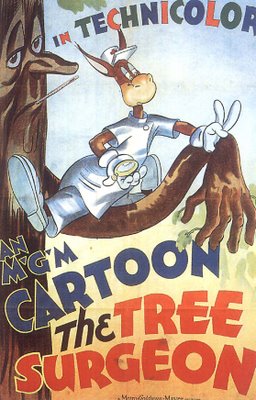
Owning MGM cartoons on 16mm conferred bragging rights unequaled by the more commonplace WB’s. Finding them was near impossible. A company called Pictoreel sold Harman and Ising shorts outright during the fifties, and home viewers could have them in either black-and-white or Kodachrome prints. It would appear the two producers retained some kind of distribution rights in these subjects, as other MGM cartoons were never legitimately available to collectors in 16mm. As for random or scattered prints (that is, ones mislaid or otherwise appropriated from TV stations or rental houses), collectors would grab a Metro almost sight unseen in those days. Often as not, color was pink, or fading. All were pigs in a poke since we seldom, or never, saw them before on TV. Much of the time that was OK, but there were disasters. I scooped up six MGM’s in 1976 for $30 each, not a bad price for such rarities. A first was The Old Plantation, which had all the rich animation and lavish backgrounds one might expect from Metro. Up next was a cartoon so dreadful that I hesitate even to recall it. My request to Warners --- now that you own The Tree Surgeon, please burn the negative. Collecting cartoons got easier when TV stations began dumping them in the late eighties. Suddenly, there were entire runs of Tom and Jerry (they had finally gone off-network and into syndication in 1977), and even the legendary Tex Avery shorts were starting to turn up. Some friends and I used to meet a longtime collector/dealer on the third Saturday of each month at a Shoney’s restaurant near Charlotte. After lunch, he’d pop his car trunk and we’d do a deal for MGM cartoons out in the parking lot. He had a friend at one of the TV stations and they were converting to videotape for all their programming. What we got would have otherwise been earmarked for the dumpster, had not reason prevailed. There were VCR’s by then, but nothing approached the purity of these classics on 16mm, and besides, the prints were in virtually new condition. It was only after all the TV stations/rental houses were emptied that supply began to dwindle. By then, so was film collecting, for now there was video projection and the remarkable clarity of DVD. We never imagined it would end, but now it pretty much has. The old Big Reel newspaper we waited for each month slimmed to wafer size, then disappeared. Whatever is left of 16mm collecting is largely confined to e-bay. It was all great while it lasted, but film could not survive in the face of digital technology (even theatres would abandon it). Some of you veteran collectors out there should write a history of that vanished era. In tomorrow’s Part Two, I promise not to digress so far from MGM cartoons, for there’s more info at hand about costs and rentals, as well as how the studio used their animated subjects as a battering ram against the despised double feature policy.
13 Comments:
Once again a great read this morning. I know Jerry Beck has been instrumental in helping Warner Brothers prepare the Looney Tunes Golden Collecton DVD series. One of the wonderful things he has done has been to replace the a.a.p. or Blue Ribbon logos with the original title cards (whenever possible). The result has been amazing to me who grew up seeing these cartoons with a standard title card. Along with the Disney Treasures series, the Golden Collection is the (forgive the pun) gold standard for animation collections on DVD. I just with that there were more MGM collections (non Tom and Jerry who has a set or two) especially the Tex Avery stuff. There was a Tex Avery vhs series- why, oh why is there no Tex Avery Collection (Droopy or anything else for that matter) on DVD?
One of my first jobs out of college in 81 was at a 16mm film rental company, which was making the transition to selling and renting videos. One day poking around in the back, I found thirty or 40 WB cartoons, wrapped on cores. They weren't in any of our catalogs, though--like most of the stuff there, the license had long run out, but the boss never got around to actually sending the films back. (One of my first tasks on the job was to respond to a licensor that wanted ten or so expired prints back--18 months overdue--that we were sending three of them and that the others were "lost in inventory.")
If you read this far, you might be interested in this link:
http://www.youtube.com/watch?v=OFhmw8rri0c
http://tinyurl.com/vut9d
A post after my own heart! I recall seeing MGM Avery cartoons as a wee child (around 1960-61 would be right) on my local New York ABC affiliate, on a kiddie show that also ran those "Billy Bang Bang" silent movie westerns narrated by two kids (anyone else remember that?). But I digress. Columbia did have it's proud lady at the front and end titles of it's cartoons through 1943. They dropped the Columbia opening logo around the same time they took the it off the Three Stooges shorts and serial chapters. If you haven't seen my web pages devoted to cartroon opening titles, you are in for a treat. Go here: http://www.cartoonresearch.com/titles.html
And I'm not at liberty to discuss, but Avery on DVD will begin in 2007.
Where I grew up in the '60s (Rhode Island), most of the stations ran mostly Popeye and Warners' 'toons. At some point, the only MGMs that turned up were Tom & Jerry, which I always avoided. In fact, if it ain't Tex Avery, I ain't interested in any of the Metro cartoons. But that's just me.
That is good news, Jerry! Thanks for the info about Tex Avery...I hope that means you will have some input into them. And thanks for your great work on those wonderful DVDs!
We got the old MGMs locally when I was a young'un. A local station had a long-running Bozo the Clown franchise and, our Bozo being on the lazy side, the show consisted mostly of cartoons. Warner Bros. and Popeye, of course, along with the aforementioned MGMs, and those 1950s Paramount cartoons masquerading as Harveytoons. Also Beany and Cecil. The drawback was that the show always started with one of those godawful Bozo the Clown cartoons. Such a price to pay!
I want to hear more about The Tree Surgeon.
Tex Avery's Cartoons have been released on DVD! In France!
Check out www.dvdfr.com for "Tex Avery (Edition Collector - Edition limitée)".
And, yes, I own one of those neat tin boxes myself. :)
Best regards,
ScoreAddict.
I'm younger than some of you, so my first cartoon experience was TV in the mid-70s.
I distinctly remember seeing the Tree Surgeon from back then. It seemed on par with a small selection of other... let's say "odd" cartoons, meaning not Bugs Bunny or other recognizable characters.
Funnily enough, my recollection is that all of them were quite good quality. There would be a periodic faded or scratched transfer to tape (I presume) and those could be any type. But these weird ones were as sharp and easy to watch as anything.
The local stations were very, very independent and/or no one paid attention to the early weekend mornings staff. They ran stuff in odd orders, so sometimes you'd see something once in several years, sometimes twice in a day (really). Who knows what package they had bought back whenever, but there were a lot, and I think I saw almost everything ever made (as long as it was color) one time or another.
If you don't like linking to things like this, don't, but for those like chris u who want to know what its all about, The Tree Surgeon in medium resolution, online: http://klangley.blogspot.com/2006/08/cartoon-tree-surgeon.html
I'm with J.C. on those Avery cartoons, Jerry. Thanks for the advance tip on their 2007 DVD arrival. Great news, indeed!
I watched that "Tree Surgeon" cartoon. Not so bad! Bland, but inoffensive. I liked when he turned into the tree -- I wish the whole thing had been that weird.
In New York, WABC bought the MGM pre-48 package, back in the days when the parent network had no national morning show. They aired them weekdays at 8 a.m. on the "Tommy Seven Show", which was hosted by a Bozo-like clown with his own theme song (sung to the tune of "Sidewalks of New York").
The problem was that while there were some great Avery cartoons in the package, there were just too many of the Disney-like H&I cartoons for it to compete with the more aggressive (and enjoyable) Warners cartoons over on WNEW and WOR and the Popeyes over on WPIX. If MGM had allowed a few more years of its cartoon library or some of the early T&Js to be included in the original syndication package, odds are it would have been more successful.
Post a Comment
<< Home